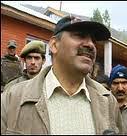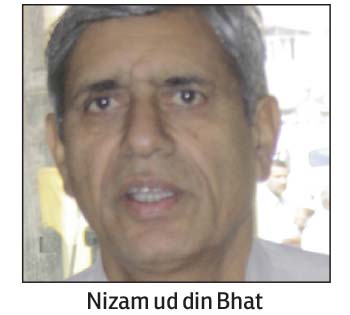Legislators meant to improve public facilities in their constituencies are encroaching existing ones, so are small rung political leaders. Police in the state is in itself a law. HAROON MIRANI reports
 Former Agriculture Minister Abdul Aziz Zargar may have lost elections and thus his ministry, he is in no mood of severing ties with the department he ruled. In 2003, Zargar occupied two of the three buildings meant for housing offices of agriculture department in Kulgam. The department had to restrict all its work to a single story building benevolently spared by the minister.
Former Agriculture Minister Abdul Aziz Zargar may have lost elections and thus his ministry, he is in no mood of severing ties with the department he ruled. In 2003, Zargar occupied two of the three buildings meant for housing offices of agriculture department in Kulgam. The department had to restrict all its work to a single story building benevolently spared by the minister.
However, even after losing his fiefdom, Zargar is no mood to leave. The only leftist legislator, Muhammad Yousuf Tarigami, doesn’t believe in occupying office spaces. In April 2005, he forcibly took control of a residential quarter meant for Assistant Executive Engineers of Public Works Department (R&B).
Across the state, political leaders and police are in possession of a number of government buildings ranging from public offices to government residential quarters. All of these buildings were occupied illegally, with blatant use of force and position. Government half hearted attempts to recover these buildings are stalled by the parties by moving to courts and getting an indefinite stay at the evacuation process.
The list of building occupiers does not just include some heavy weight cabinet ministers but low rung political activists as well, who have managed to get hold of prized properties according to influence they yield.
When Zargar occupied two buildings of agriculture department at Kulgam, he was least bothered about the problems faced by the department due to scarcity of space which restricted it to a four-room single storey structure. The Chief Agriculture Officer has to operate from a rented accommodation.
“We have many sections and almost all are virtually dumped in this building. District store, Zonal store, offices of Agriculture Assistant (Inputs), Extension Officer, Apiculture Development Officer and Sub-divisional Agriculture Officer are housed in this shabby structure,” complains Surinder Kumar Mattoo, Sub-Divisional Agricultural Officer Kulgam. “After the creation of this district (Kulgam), five district level officers are expected to take over responsibilities soon but there is no building at hand to accommodate them other than this rented space.
“These politicians have become law breakers. What is the logic of occupying accommodation here (in Kulgam) when Zargar has it already in Srinagar’s high security zone Tulsibagh,” questions one.
Nearby, at Karewa Kulgam, the residential quarter close to PHE complex is occupied by Communist Party of India (M) general secretary, Mohammad Yousuf Tarigami. It includes a waiting shed, guard rooms and a 10-room building.
“On the eve of election (2008), Tarigami deposited peanuts as the rent of the building at Rs 400 a month,” an official of R&B told Kashmir Life.
Similarly, Special Operations Group (SOG) of Jammu and Kashmir Police have been occupying two buildings of R&B department situated near court complex in Kulgam since 1992. The occupation came at the cost of departmental record.
According to officials, SOG personnel threw office files out on the road during night witnessing torrential rains.
The saga of occupation is not limited to Kulgam, a number of buildings are similarly occupied by the police and politicians in other districts.

In Gandebal, five buildings of Irrigation Department have been occupied by police for more than a decade. The buildings have been converted into District Police Lines. The Irrigation Department has sent number of reminders to police for the vacation of these buildings but police does not respond. The buildings are located on the Srinagar-Leh highway at Guzarbal.
In Bandipora district, former MLA Usman Majid occupied a residential quarter of Assistant Engineer R&B more than a decade ago and he is in mood of vacating it.
Not to be left behind, the present MLA Nizamudin Bhat has managed to get hold of BDO’s quarter along with his office. “In fact the first thing Nizamuddin Bhat did after becoming MLC was to occupy the best government building,” said a local resident. “It seems the power corrupts these leaders right on the first day.”
 Though the legislators get official bungalows for their accommodation in Srinagar, they seem to think of occupation as their right in their constituencies. They enjoy police security and no government official usually dares to throw them out. On their part, legislators don’t hesitate to use force or influence to stall any efforts to get them evicted.
Though the legislators get official bungalows for their accommodation in Srinagar, they seem to think of occupation as their right in their constituencies. They enjoy police security and no government official usually dares to throw them out. On their part, legislators don’t hesitate to use force or influence to stall any efforts to get them evicted.
However, one doesn’t need to be a minister or a legislator to occupy a public building. Even block level political activists have joined the league. Ghulam Mohammad Malik, Block President of National Conference has been occupying an irrigation department hut in Bandipora since 1999. Buoyed by the strength of his personal guards and links with top political leaders, he has been successful in thwarting attempts by administration to snatch the prized accommodation from him.
Again in Bandipora, Police has occupied a Forest Protection Office in the main town. Almost all of these occupied buildings in Bandipora are in close vicinity making the complex an occupier’s colony. The Forest Protection office is behind R&B office in main town.
In many cases, police and politicians have laid their hands on the best buildings in prime locations. For example in Tral, the government had built a Town Hall building. The aesthetically designed building with beautiful wood panelling came at the cost of millions of rupees. Before the building could be used by the concerned agencies it was occupied by security agencies. The building kept changing hands from one battalion to another. Currently, its proud owners are the SOG and Border Security Force. Practically speaking, the administration has abandoned any hope of getting the building back from police as its attempts are always countered with security issues.
The politicians use these buildings for all of their works. A part of it is used for the residence and another part is usually meant for the office. One can see people lining to meet these leaders in the same buildings.
During elections, the buildings act as the campaign offices for these parties in general and for the immediate candidates in particular. During the last parliamentary and assembly elections, the official buildings in Bandipora were blatantly used by the political parties. The entire party campaign for the district was managed from these buildings in violation of all rules and regulations. The election commission was also complained about the violation of model code of conduct which prohibits official infrastructure to be used for election campaigns, but no action was taken against the occupiers or their parties.
In Tral, Kulgam and Bandipore, a number of officials were threatened against pursuing eviction of these leaders from the government buildings. “It needs strong government will to evict these powerful illegal occupants otherwise the administration puts forwards a single official to face the wrath of these people,” said a senior official in Bandipora, wishing not to be named. The official in the past has been threatened by such people during his ill fated campaign to get hold of these buildings.















